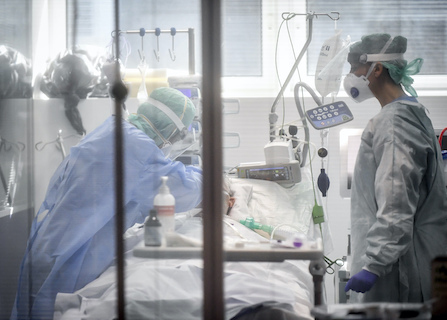Philadelphia officials say the majority of people who have tested positive for the coronavirus are Black.
There’s a total of 1,675 positive cases currently in Philadelphia but only 528 of those cases have racial data. The information indicates that around 46 percent of those 528 positive cases in the city are Black, Philadelphia’s Public Health Commissioner Thomas Farley said at a press conference on Wednesday, according to the Philadelphia Tribune.
“This drives home the point that this virus is affecting all populations in the city of Philadelphia; it doesn’t discriminate,” Farley said. “Every racial and ethnic group, indeed every person in this city is at risk. We all need to be very serious about social distancing and other recommendations to keep residents healthy and slow the spread of the virus.”
SIGN UP FOR OUR NEWSLETTER:
While the city has racial data for only 31.5 percent of the confirmed 1,675 positives. Philadelphia is 43.7 percent Black, according to census data.
People of every ethnicity and nationality are affected globally, lack of data about African Americans who are infected by coronavirus has alarmed lawmakers and some are calling for the Department of Health and Human Services to produce the information.
This week, in a letter to HHS Secretary Alex Azar, Rep. Ayanna Pressley and Sen. Elizabeth Warren said the data that would indicate, things like how many Black people have died from complications associated with coronavirus, is nonexistent, according to the Associated Press.
“Any attempt to contain COVID-19 in the United States will have to address its potential spread in low-income communities of color, first and foremost to protect the lives of people in those communities, but also to slow the spread of the virus in the country as a whole,” Pressley and Warren wrote to Azar. “This lack of information will exacerbate existing health disparities and result in the loss of lives in vulnerable communities.”
LIKE US ON FACEBOOK. FOLLOW US ON INSTAGRAM & TWITTER. SUBSCRIBE TO OUR YOUTUBE.
cities with large African American populations including Detroit, Milwaukee, New Orleans and Chicago have all emerged as hotspots for the growth of coronavirus over the last week, while New York remains the epicenter.
“The virus is an equal-opportunity crisis … but the impact and the burden of it is not going to be shared equally,’’ said Dr. Ashwin Vasan, a public health expert and assistant professor at Columbia University, told USA Today. “Like most things in society, it’s going to be regressive. It’s going to be felt disproportionately by the poor, the vulnerable, the marginalized, and obviously that falls down in this country on communities of color.’’
[ione_media_gallery id=”181345″ overlay=”true”]


